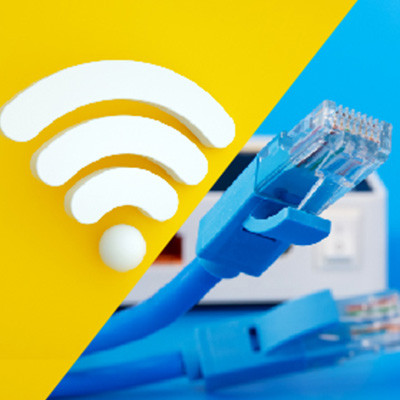Jackson Thornton Technologies News + Updates
What Should You Prioritize, Wireless or Wired Connections?
Everyone associated with your business is constantly connected to the Internet. You know how you can tell? Tell them the Wi-Fi is down for a couple of hours and see what their reaction is. With so much weighing on your ability to connect to the Internet you have to make a decision: Do you wire your connections to the web or do you deploy strong Wi-Fi and try to do it that way?
It may not matter to your staff, but to be the best business you can be, knowing the benefits of any decision helps you make them. Let’s look at some of the benefits associated with wired and wireless connections.
Wired Connections
A wired connection is when you physically connect a device—in most cases a PC—directly to the network through a cable. Here are some of the benefits of wired connections:
- Reliability - Wired connections are generally more reliable. They are less susceptible to interference and signal loss, making them ideal for critical applications like online gaming or business environments where a stable connection is crucial.
- Speed - Wired connections often provide faster and more consistent data transfer speeds compared to wireless connections. This can be important for tasks that require a lot of bandwidth, such as streaming high-definition videos or large file downloads/uploads.
- Security - Wired connections are typically more secure than wireless connections because they are harder to intercept without physical access to the cables. This can be important for sensitive data transmission.
- Stability - Wired connections are not affected by factors like distance from the router or the presence of obstacles (walls, furniture, etc.), which can impact the performance of wireless connections.
Wireless Connections
Wireless networks are connections produced in the ether. Wi-Fi has become one of the most indispensable technologies as people depend on smartphones, but what are the benefits of using Wi-Fi for your business? Here are a few:
- Convenience - Wireless connections offer the convenience of mobility. You can connect devices without the need for physical cables, which is especially useful for smartphones, laptops, and other portable devices.
- Flexibility - Wireless networks allow you to connect multiple devices simultaneously without the need for additional cables or ports. This can be advantageous in settings with many connected devices.
- Ease of Installation - Setting up a wireless network is generally easier and less intrusive than running cables throughout a building.
- Scalability - Wireless networks can be easily expanded to cover larger areas by adding access points, whereas wired networks may require more complex cabling infrastructure.
- Aesthetic and Cost - Wireless setups can be more aesthetically pleasing since they don't involve visible cables and it doesn’t come with any additional costs.
It’s up to you to figure out what is best for your business. Regardless of what you choose, the IT professionals at Jackson Thornton Technologies can help. Give us a call at (877) 226-9091 to learn more.



Comments